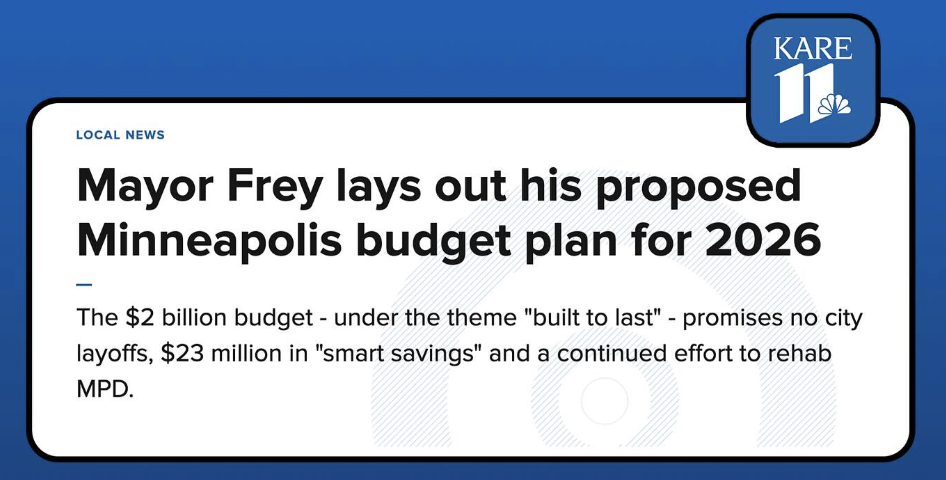Let’s Talk Policy: Budget
From now through the end of the year, the city council and mayor will be working out the 2026 Minneapolis Budget. This is one of the most important jobs of the city council. There’s no doubt our city is facing financial challenges that will make the budgeting process more difficult than usual. Yet this is merely one symptom of a problem that is more fundamental and personal – many in our communities feel economic pressures daily as prices for essential goods and services rise, impacting their own budgets and financial well-being. In addition, many residents are struggling with housing costs, debt and healthcare expenses.
We all know that any budget (whether personal or governmental) starts with income. As a city we are facing serious headwinds when it comes to our sources of revenue. In 2022, “Intergovernmental Revenues” from Federal, State and Local grants totaled nearly $500 million. Now fast forward to 2025, where those same sources of revenue are pegged to drop 60%, to under $200 million -- a $300 million annual shortfall in only three years.
Property taxes are also a major source of revenue. In 2025, property tax revenues were $478 million, up almost 60% from ten years ago ($300 million in 2016). For Ward 7 residents, the average property tax increase in 2025 alone was 13%. It’s likely we’ll see another increase next year. The burden of our city’s property tax revenue is increasingly falling on homeowners and renters because of crashing commercial property values in downtown Minneapolis.
The best way to increase revenue for our city isn’t to heap more taxes on our residents and businesses. I would not support a new wealth tax on Minneapolis residents, as the current city council is exploring. Any new wealth tax would need to be regional. At this point in time, I would not support increasing utility franchise fees on Minneapolis residents as our current councilmember showed interest in just last week (1:22 through CM Vetaw’s response).
What we do need to do is increase our residential tax base with more affordable housing, while also driving overall economic and job growth. A recent Star Tribune article highlighted how the Twin Cities and Minnesota have fallen behind: out of 11 similar metro regions, the Twin Cities ranked ninth in economic growth and dead last in job growth this past year. Minneapolis needs to stay competitive in order to attract businesses. We can be pro-business and pro-union at the same time, but our majority city council acts as if they are mutually exclusive. We need more business and investment to drive good jobs and fair wages, and I’ll work hard to create the conditions to foster that if elected.
The fiscal leadership (or missteps) of the next elected council will either help ease the current financial crisis or ensnare us further in unrealistic spending and more residential tax increases. I will not be afraid to make hard choices and lead. Our residents should expect nothing less from their leaders.

